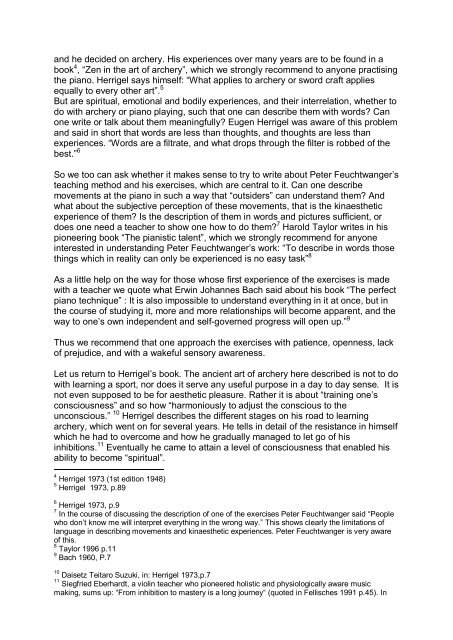Zen in the art of playing the piano - Peter Feuchtwanger
Zen in the art of playing the piano - Peter Feuchtwanger
Zen in the art of playing the piano - Peter Feuchtwanger
You also want an ePaper? Increase the reach of your titles
YUMPU automatically turns print PDFs into web optimized ePapers that Google loves.
and he decided on archery. His experiences over many years are to be found <strong>in</strong> a<br />
book 4 , <strong>Zen</strong> <strong>in</strong> <strong>the</strong> <strong>art</strong> <strong>of</strong> archery, which we strongly recommend to anyone practis<strong>in</strong>g<br />
<strong>the</strong> <strong>piano</strong>. Herrigel says himself: What applies to archery or sword craft applies<br />
equally to every o<strong>the</strong>r <strong>art</strong>. 5<br />
But are spiritual, emotional and bodily experiences, and <strong>the</strong>ir <strong>in</strong>terrelation, whe<strong>the</strong>r to<br />
do with archery or <strong>piano</strong> play<strong>in</strong>g, such that one can describe <strong>the</strong>m with words? Can<br />
one write or talk about <strong>the</strong>m mean<strong>in</strong>gfully? Eugen Herrigel was aware <strong>of</strong> this problem<br />
and said <strong>in</strong> short that words are less than thoughts, and thoughts are less than<br />
experiences. Words are a filtrate, and what drops through <strong>the</strong> filter is robbed <strong>of</strong> <strong>the</strong><br />
best. 6<br />
So we too can ask whe<strong>the</strong>r it makes sense to try to write about <strong>Peter</strong> <strong>Feuchtwanger</strong>s<br />
teach<strong>in</strong>g method and his exercises, which are central to it. Can one describe<br />
movements at <strong>the</strong> <strong>piano</strong> <strong>in</strong> such a way that outsiderscan understand <strong>the</strong>m? And<br />
what about <strong>the</strong> subjective perception <strong>of</strong> <strong>the</strong>se movements, that is <strong>the</strong> k<strong>in</strong>aes<strong>the</strong>tic<br />
experience <strong>of</strong> <strong>the</strong>m? Is <strong>the</strong> description <strong>of</strong> <strong>the</strong>m <strong>in</strong> words and pictures sufficient, or<br />
does one need a teacher to show one how to do <strong>the</strong>m? 7 Harold Taylor writes <strong>in</strong> his<br />
pioneer<strong>in</strong>g book The pianistic talent, which we strongly recommend for anyone<br />
<strong>in</strong>terested <strong>in</strong> understand<strong>in</strong>g <strong>Peter</strong> <strong>Feuchtwanger</strong>s work: To describe <strong>in</strong> words those<br />
th<strong>in</strong>gs which <strong>in</strong> reality can only be experienced is no easy task 8<br />
As a little help on <strong>the</strong> way for those whose first experience <strong>of</strong> <strong>the</strong> exercises is made<br />
with a teacher we quote what Erw<strong>in</strong> Johannes Bach said about his book The perfect<br />
<strong>piano</strong> technique: It is also impossible to understand everyth<strong>in</strong>g <strong>in</strong> it at once, but <strong>in</strong><br />
<strong>the</strong> course <strong>of</strong> study<strong>in</strong>g it, more and more relationships will become apparent, and <strong>the</strong><br />
way to ones own <strong>in</strong>dependent and self-governed progress will open up. 9<br />
Thus we recommend that one approach <strong>the</strong> exercises with patience, openness, lack<br />
<strong>of</strong> prejudice, and with a wakeful sensory awareness.<br />
Let us return to Herrigels book. The ancient <strong>art</strong> <strong>of</strong> archery here described is not to do<br />
with learn<strong>in</strong>g a sport, nor does it serve any useful purpose <strong>in</strong> a day to day sense. It is<br />
not even supposed to be for aes<strong>the</strong>tic pleasure. Ra<strong>the</strong>r it is about tra<strong>in</strong><strong>in</strong>g ones<br />
consciousnessand so how harmoniously to adjust <strong>the</strong> conscious to <strong>the</strong><br />
unconscious. 10 Herrigel describes <strong>the</strong> different stages on his road to learn<strong>in</strong>g<br />
archery, which went on for several years. He tells <strong>in</strong> detail <strong>of</strong> <strong>the</strong> resistance <strong>in</strong> himself<br />
which he had to overcome and how he gradually managed to let go <strong>of</strong> his<br />
<strong>in</strong>hibitions. 11 Eventually he came to atta<strong>in</strong> a level <strong>of</strong> consciousness that enabled his<br />
ability to become spiritual.<br />
4 Herrigel 1973 (1st edition 1948)<br />
5 Herrigel 1973, p.89<br />
6 Herrigel 1973, p.9<br />
7 In <strong>the</strong> course <strong>of</strong> discuss<strong>in</strong>g <strong>the</strong> description <strong>of</strong> one <strong>of</strong> <strong>the</strong> exercises <strong>Peter</strong> <strong>Feuchtwanger</strong> said People<br />
who dont know me will <strong>in</strong>terpret everyth<strong>in</strong>g <strong>in</strong> <strong>the</strong> wrong way.This shows clearly <strong>the</strong> limitations <strong>of</strong><br />
language <strong>in</strong> describ<strong>in</strong>g movements and k<strong>in</strong>aes<strong>the</strong>tic experiences. <strong>Peter</strong> <strong>Feuchtwanger</strong> is very aware<br />
<strong>of</strong> this.<br />
8 Taylor 1996 p.11<br />
9 Bach 1960, P.7<br />
10 Daisetz Teitaro Suzuki, <strong>in</strong>: Herrigel 1973,p.7<br />
11 Siegfried Eberhardt, a viol<strong>in</strong> teacher who pioneered holistic and physiologically aware music<br />
mak<strong>in</strong>g, sums up: From <strong>in</strong>hibition to mastery is a long journey(quoted <strong>in</strong> Fellisches 1991 p.45). In



